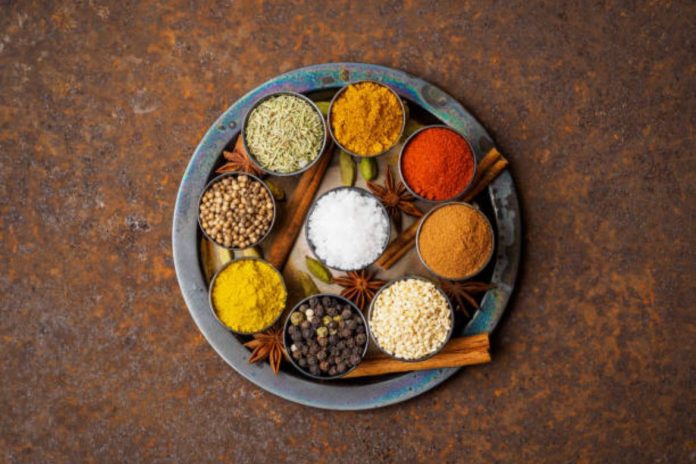Spices are the heart and soul of Indian cuisine, offering more than just flavor—they provide a wealth of health benefits. Whether you’re an experienced cook or just starting, having a few key spices in your pantry can elevate your meals and boost your well-being. Here’s a guide to the best everyday spices to keep in your kitchen, their health benefits, and how to use them.
1. Turmeric (Haldi)
Why It’s Essential:
Turmeric is a golden-yellow spice that has long been used for its medicinal properties. It contains curcumin, a compound known for its powerful anti-inflammatory and antioxidant properties. Turmeric is often used to promote immunity, reduce joint pain, and support digestive health.
How to Use:
Add turmeric to curries, rice, and dals for a rich color and earthy flavor. It can also be stirred into warm milk for a soothing bedtime drink known as “golden milk.” You can even mix it with honey to treat a sore throat or cough.
2. Cumin (Jeera)
Why It’s Essential:
Cumin is an aromatic spice that adds a warm, nutty flavor to dishes. Rich in iron and antioxidants, cumin helps in digestion, boosts metabolism, and aids in detoxification. It is also known for its ability to relieve bloating and indigestion.
How to Use:
Add cumin to rice, curries, soups, or stews. It is also commonly used in spice blends like garam masala and can be roasted to bring out its flavor before sprinkling it on salads, roasted vegetables, or even yogurt.
3. Coriander (Dhania)
Why It’s Essential:
Coriander is a versatile herb and spice, offering both fresh leaves and dried seeds. Coriander is loaded with antioxidants and has been used for its digestive properties, helping with bloating and supporting healthy blood sugar levels.
How to Use:
The seeds can be ground into powder and added to curries, soups, and chutneys. Fresh coriander leaves (cilantro) can be sprinkled on top of dishes like salads, salsas, or curries to add a burst of fresh flavor.
4. Ginger (Adrak)
Why It’s Essential:
Ginger is an aromatic root known for its anti-inflammatory properties and its ability to aid digestion. It is also commonly used to relieve nausea and support immune function, making it a must-have for your health.
How to Use:
Grate fresh ginger into teas, smoothies, or stir-fries. It’s also a great addition to curries and rice dishes. Ginger pairs well with garlic, and together they form the base for many flavorful marinades and sauces.
5. Garlic (Lahsun)
Why It’s Essential:
Garlic is known for its strong flavor and health benefits. It contains allicin, which is believed to help reduce cholesterol levels, fight infections, and support heart health. Garlic also has potent anti-inflammatory properties.
How to Use:
Chop, crush, or mince garlic and add it to curries, soups, salads, or pasta sauces. You can also roast garlic for a sweeter, milder flavor and spread it on toast or mix it with butter for a delicious spread.
6. Black Pepper (Kali Mirch)
Why It’s Essential:
Black pepper is often called the “king of spices.” It not only adds heat and depth to dishes but also helps with digestion and the absorption of nutrients, particularly curcumin from turmeric. Black pepper also has anti-inflammatory and antioxidant properties.
How to Use:
Add freshly ground black pepper to salads, soups, stews, and sauces. It can also be used to season vegetables or meats before roasting, grilling, or sautéing. For added health benefits, pair black pepper with turmeric to enhance absorption.
7. Cinnamon (Dalchini)
Why It’s Essential:
Cinnamon is a warm, sweet spice that has been used for centuries for its medicinal properties. It helps regulate blood sugar levels, supports heart health, and has anti-inflammatory and antioxidant benefits.
How to Use:
Add cinnamon sticks or ground cinnamon to desserts, teas, smoothies, or even savory dishes like curries and stews. You can also sprinkle cinnamon on oatmeal or yogurt for a healthy, flavorful breakfast.
8. Fennel Seeds (Saunf)
Why It’s Essential:
Fennel seeds are commonly used in Indian cooking for their sweet, licorice-like flavor. Fennel is known for its digestive benefits and is often used to relieve bloating, indigestion, and stomach discomfort. It’s also packed with antioxidants.
How to Use:
Chew on a few fennel seeds after meals as a natural mouth freshener or digestive aid. You can also add fennel seeds to tea or sprinkle them in curries and vegetable dishes for a slightly sweet, aromatic flavor.
9. Mustard Seeds (Rai)
Why It’s Essential:
Mustard seeds are commonly used in Indian tempering (tadka) to release their pungent flavor and health-promoting properties. Mustard seeds are high in antioxidants and have antibacterial, anti-inflammatory, and digestive benefits.
How to Use:
Add mustard seeds to hot oil to prepare tempering for dals, curries, or chutneys. Mustard seeds are also used in pickling and marinades, giving your dishes a tangy kick.
10. Cardamom (Elaichi)
Why It’s Essential:
Cardamom is an aromatic spice that aids digestion, freshens breath, and has detoxifying properties. It’s also known for its calming effects, helping reduce stress and improve sleep quality.
How to Use:
Add crushed cardamom pods to your morning tea or coffee for a fragrant, refreshing twist. It can also be added to desserts, curries, rice dishes, and smoothies for a subtle, sweet-spicy flavor.
Conclusion: Elevate Your Meals with Spices
Incorporating these everyday spices into your cooking routine not only enhances the flavor of your meals but also offers a host of health benefits. These spices are affordable, versatile, and can easily be found in most kitchens or local markets. So, next time you’re preparing a meal, don’t forget to reach for these magical ingredients and enjoy both their taste and their wellness properties!








